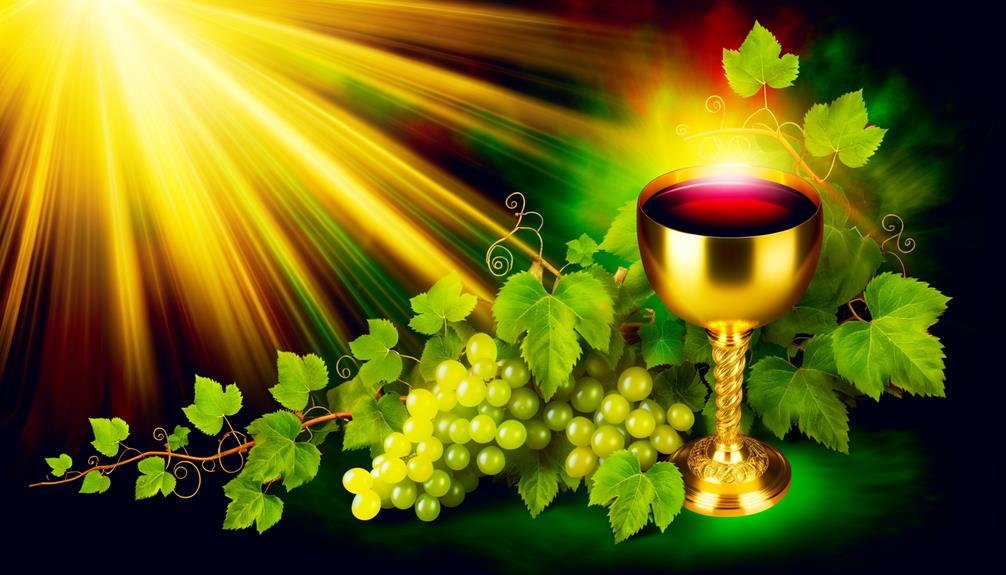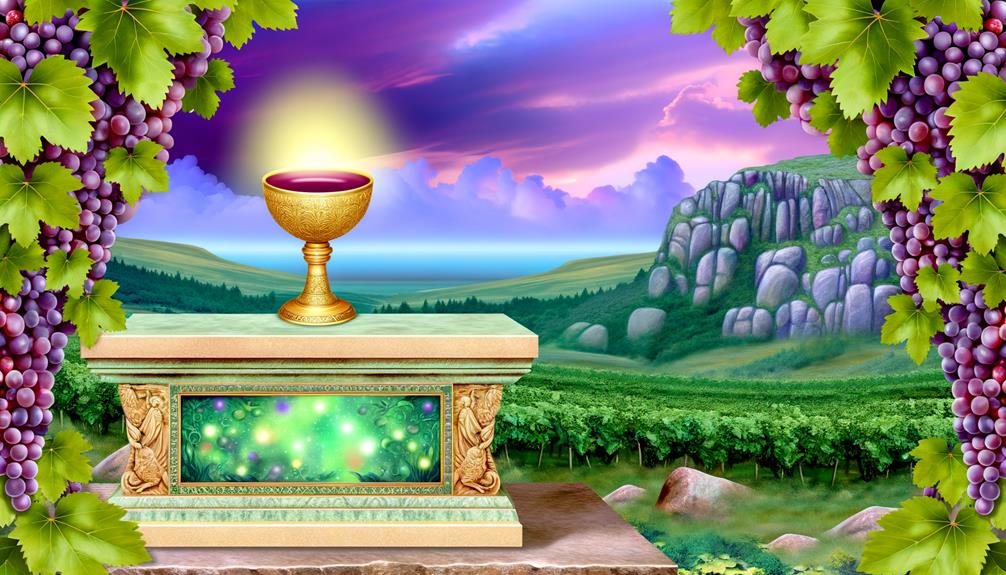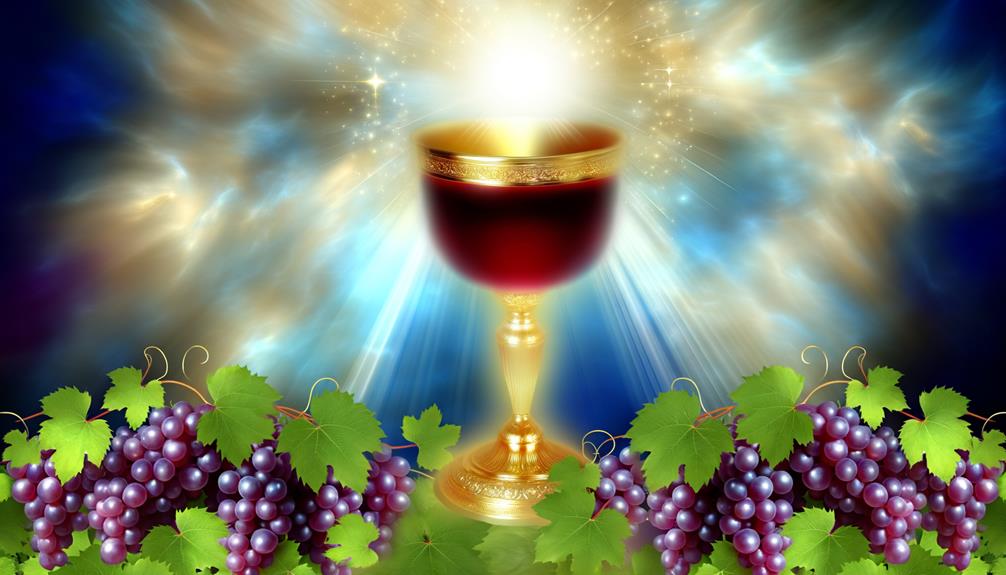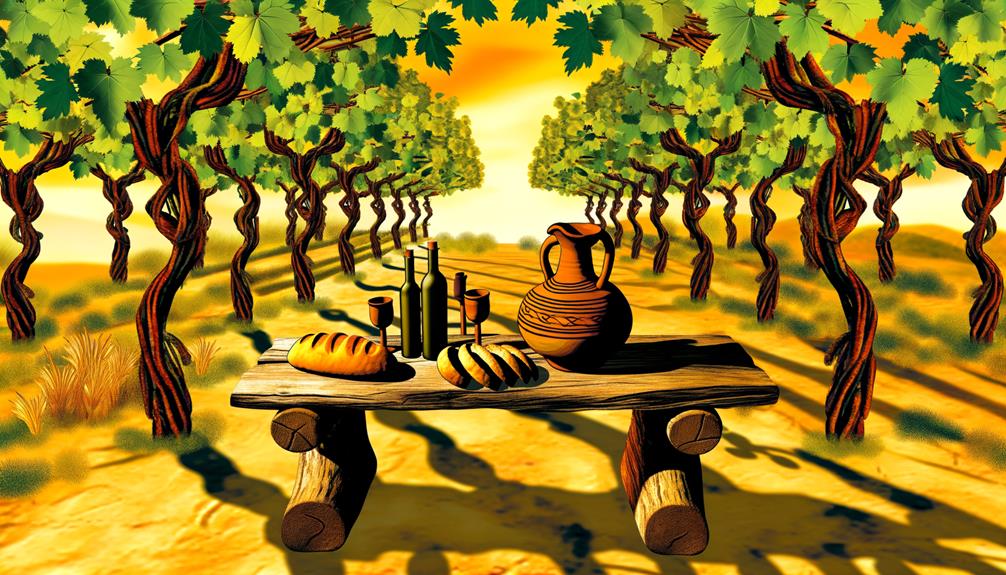Symbolic Meaning of Wine in the Bible: Celebration
Wine in the Bible holds multifaceted symbolic significance, representing joy, divine blessing, covenantal commitment, and spiritual nourishment. It is often associated with celebration and prosperity, as seen in Psalm 104:15 and the wedding at Cana.
Wine also exemplifies covenantal rituals and divine favor, highlighted in Deuteronomy 7:13 and the Last Supper (Luke 22:20). In addition, prophetic imagery, such as in Amos 9:13, showcases wine as a symbol of both divine judgment and future blessings.
These varied contexts illustrate wine’s profound role within biblical narratives, suggesting intricate theological and communal dimensions to explore further.

Symbolic Meaning of Wine in the Bible: Spiritual Insights and Interpretations
| Aspect | Symbolic Meaning | Biblical Reference |
|---|---|---|
| Joy and Celebration | Represents happiness and festivity. | Psalm 104:15 |
| Covenant | Symbolizes the blood of Christ and divine covenant. | Matthew 26:27-29 |
| Transformation | Signifies spiritual transformation and renewal. | John 2:1-11 (Wedding at Cana) |
| Divine Blessing | Reflects abundance and blessings from God. | Proverbs 3:9-10 |
Wine as a Symbol of Joy

In biblical texts, wine frequently serves as a potent symbol of joy and divine blessing, reflecting the celebratory and communal aspects of ancient Near Eastern cultures.
Scriptural narratives often depict wine as a central element in festal occasions, such as wedding feasts and religious ceremonies. For instance, Psalm 104:15 extols wine for gladdening the human heart, emphasizing its role in human celebration.
Additionally, the transformation of water into wine at the Cana wedding in John 2:1-11 underscores its symbolic significance in mirroring divine joy. This association with joy extends beyond mere physical pleasure, embodying a deeper spiritual contentment and communal unity.
Consequently, wine operates as a multifaceted symbol within biblical literature, encapsulating both temporal delight and spiritual fulfillment.
The Blessing of Wine

The blessing of wine in biblical scripture often signifies divine favor and covenantal promises, encapsulating themes of abundance and providence.
In Deuteronomy 7:13, God’s promise to bless Israel includes the provision of grain, new wine, and oil, symbolizing a land of prosperity.
Similarly, Psalm 104:15 highlights wine as a gift that gladdens human hearts, reflecting God’s care and generosity.
This motif is further reinforced in Genesis 27:28, where Isaac’s blessing upon Jacob invokes the dew of heaven and the richness of the earth, with an emphasis on wine as a sign of sustenance and well-being.
Consequently, wine in these contexts is a tangible representation of God’s bountiful blessings and enduring commitment to His people.
Wine in Covenant Rituals

In biblical covenant rituals, wine emerges as a potent symbol, embodying both the sacred and communal aspects of these solemn agreements.
Its ritual significance is revealed through various scriptural instances where wine is used to sanctify and seal covenants between God and His people.
This sacred symbolism underscores the transformative power and divine blessing inherent in these pacts.
Ritual Significance Unveiled
Integral to biblical covenant rituals, wine serves as a profound symbol of divine agreement and communal fellowship. In these sacred ceremonies, wine not only represents the blood of covenant but also functions as a tangible medium through which divine promises are sealed and communal bonds strengthened. The following table delineates key aspects of wine’s ritual significance:
| Aspect | Old Agreement Example | New Agreement Application |
|---|---|---|
| Blood Covenant | Genesis 14:18 (Melchizedek) | Luke 22:20 (Last Supper) |
| Festive Joy | Psalm 104:15 | John 2:1-10 (Wedding at Cana) |
| Divine Blessing | Deuteronomy 7:13 | Matthew 26:27-28 (Eucharist) |
| Community Bond | Exodus 24:8 | Acts 2:42 (Early Christians) |
| Prophetic Hope | Amos 9:14 | Revelation 19:9 (Marriage Supper of the Lamb) |
This multidimensional role of wine underscores its integral place in biblical rituals, reflecting deep theological and communal values.
Wine as Sacred Symbol
Wine, serving as a sacred symbol in covenant rituals, embodies the profound intertwining of divine promise and human participation within biblical narratives.
In the Old Covenant, wine is integral to the Mosaic Covenant, signifying joy and divine blessing (Deuteronomy 14:26).
This symbolic use also extends to the New Covenant, where Jesus employs wine during the Last Supper to represent His blood, establishing the New Covenant (Luke 22:20).
Such ritualistic use of wine encapsulates the essence of covenantal theology—binding the human and divine in a mutual, sacred pact.
Consequently, wine goes beyond mere physical sustenance, representing spiritual nourishment and the eternal bond between God and His people, reaffirming faith and divine fidelity.
Wine as Spiritual Nourishment

In biblical texts, wine frequently embodies the concept of spiritual nourishment, symbolizing divine blessing and abundance bestowed upon God’s people.
This symbolism underscores the integral role of wine in covenant and communion, reflecting the deeper spiritual connection and fellowship among believers.
Additionally, wine represents joy and celebration, illustrating the transformative power of divine grace in the lives of the faithful.
Divine Blessing Symbolism
How does wine serve as a potent symbol of divine blessing and spiritual nourishment within the biblical context? In the scriptures, wine is often associated with God’s favor and the sustenance of the soul. This sacred beverage transcends mere physical sustenance, embodying spiritual enrichment and divine generosity. The nuanced symbolism of wine emerges through various biblical narratives, reflecting its deep theological implications.
Abundance and Prosperity: Wine often signifies material and spiritual abundance, as seen in Psalms 104:15.
Joy and Celebration: It is a symbol of joy and festivity, enhancing communal and divine celebrations.
Restoration and Healing: Wine is depicted as a healing agent, emphasizing restoration in passages like Isaiah 1:6.
Divine Favor: The provision of wine is frequently portrayed as a sign of God’s favor and blessings.
Covenant and Communion
Integral to the biblical narrative, the use of wine in covenantal and communal contexts underscores its role as a profound symbol of spiritual nourishment and divine fellowship.
In the New Scripture, wine is central to the Last Supper, where Jesus establishes a new covenant, signifying his blood shed for humanity. This act of sharing wine fosters a sense of unity and participation in the divine promise, reinforcing communal bonds.
Similarly, the Old Scripture often associates wine with sacrificial offerings, aligning it with divine encounters and covenant renewals. The consistent use of wine in these sacred rites highlights its enduring significance as a medium of spiritual sustenance and a tangible reminder of God’s abiding presence and covenantal faithfulness.
Joy and Celebration
Beyond its covenantal significance, wine in the Bible also embodies the themes of joy and celebration, serving as a potent symbol of spiritual nourishment and divine blessing. It frequently appears in scriptural narratives that depict festivity and divine favor.
Wine’s association with joy and communal gatherings underscores its role in fostering spiritual and social bonds among believers.
- Biblical Feasts: Wine is central to celebrations such as the Passover, highlighting communal joy and remembrance.
- Miracles of Abundance: Jesus’ transformation of water into wine at Cana symbolizes divine provision and joy.
- Prophetic Imagery: Prophets often use wine to depict a future era of prosperity and divine favor.
This multifaceted symbol enriches our understanding of biblical joy and divine generosity.
Sacrifice and Wine Offerings

The symbolic role of wine in biblical sacrifice and offerings underscores its significance as a representation of covenantal relationship and divine blessing.
In the Hebrew Bible, wine was a critical element in various sacrificial rituals, particularly the libation offerings, where it was poured out as an act of worship (Exodus 29:40). This act signified submission to God and acknowledgment of His providence.
Wine, a product of labor and harvest, symbolized the people’s gratitude and reliance on divine favor. In addition, its inclusion in sacrificial ceremonies highlighted the sanctity and solemnity of the covenant between God and Israel.
Consequently, wine served not merely as an offering but as a profound indication of the depth of spiritual devotion and communal identity.
Wine in Jesus’ Teachings

In the teachings of Jesus, wine emerges as a profound symbol of transformation, community, and divine grace. Its significance is vividly illustrated through various parables and miracles, encapsulating deeper theological truths.
The miracle at Cana, where Jesus transforms water into wine, underscores his divine authority and the inception of a new covenant. Additionally, during the Last Supper, wine represents Jesus’ blood, signifying the ultimate sacrifice for humanity’s redemption.
- Transformation: Water into wine at Cana.
- Community: Fellowship in the sharing of wine at meals.
- Divine Grace: Wine as a symbol of Jesus’ sacrificial blood.
These elements collectively convey the multifaceted symbolism of wine in Jesus’ teachings.
Prophetic Imagery of Wine

Manifesting in prophetic visions, wine frequently symbolizes both God’s judgment and His abundant blessings.
In the prophetic books, such as Isaiah and Jeremiah, wine is often a metaphor for divine retribution, as illustrated by the imagery of the winepress, where God crushes nations under His wrath (Isaiah 63:3).
Conversely, prophets like Amos and Joel use wine to signify future blessings and prosperity, representing a time of divine favor and restoration (Amos 9:13).
This dual symbolism underscores the complexity of God’s relationship with humanity, where wine acts as both a punitive and redemptive agent.
Therefore, prophetic imagery of wine encapsulates theological themes of justice, mercy, and the eschatological hope inherent in biblical prophecy. This vivid imagery not only highlights the richness of God’s promises but also serves as a stark reminder of the consequences of human actions. The contrasting notion of the “symbolic meaning of dust eating” symbolizes the degradation and sins that lead to spiritual famine, underscoring the necessity for repentance and renewal. In this way, wine becomes a multifaceted symbol, weaving together God’s covenantal love and the call to transformation amid a broken world.
Cultural Contexts of Wine in Scripture

While examining the cultural contexts of wine in Scripture, it is imperative to contemplate the agricultural, social, and religious practices of ancient Near Eastern societies.
Wine production and consumption were deeply embedded in these cultures, influencing various aspects of daily life and spiritual expression. The significance of wine can be further understood through:
- Agricultural Practices: Vine cultivation was a labor-intensive process, reflecting the agrarian lifestyle.
- Social Interaction: Wine was central to communal gatherings and celebrations, fostering social cohesion.
- Religious Rituals: Wine held a ceremonial role, used in offerings and sacred rites.
Through these lenses, one can appreciate the multifaceted role of wine in biblical times.
Conclusion
In the biblical narrative, wine emerges as an allegorical vessel, embodying themes of joy, divine blessing, covenantal rituals, and spiritual sustenance.
The sacred liquid flows through sacrificial rites and prophetic visions, enriching the theological tapestry with its multifaceted symbolism.
The teachings of Jesus and the cultural contexts therein further illuminate wine’s profound spiritual significance.
Consequently, wine transcends mere physicality, serving as a conduit for divine grace and a proof of the enduring covenant between the divine and humanity.






